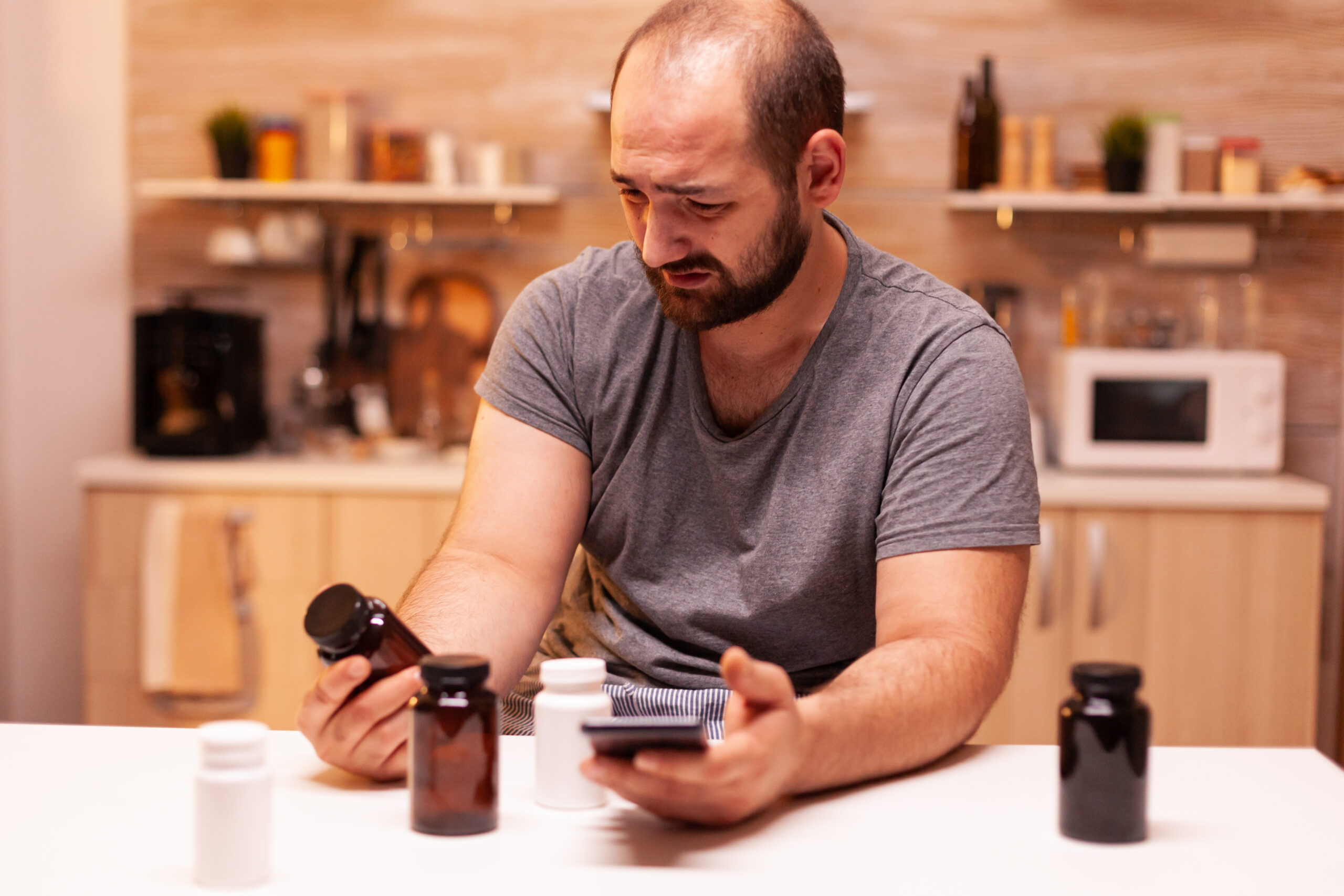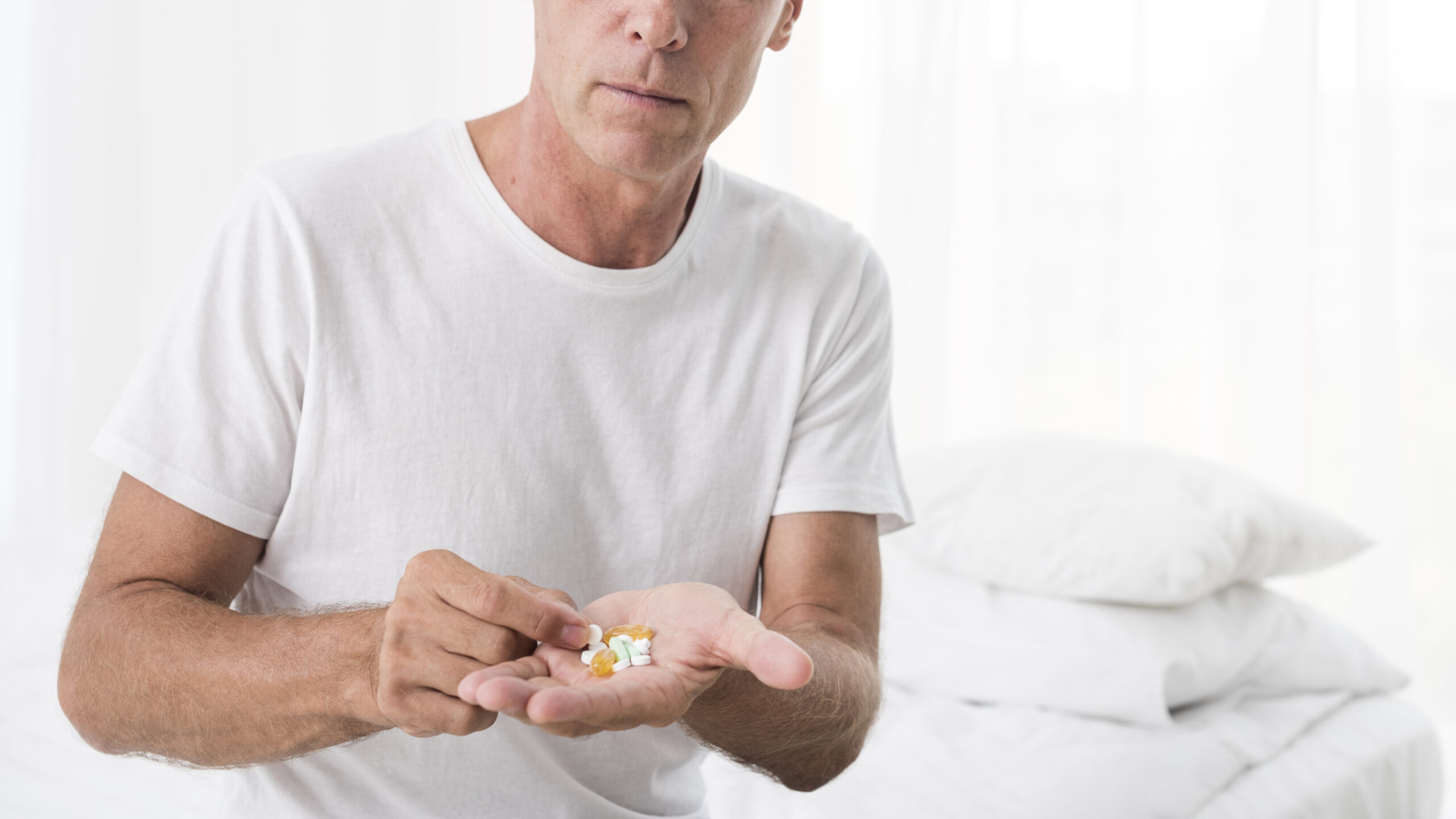Back To Top
Browse
Testosterone is a sex hormone. For men, this is important for developing characteristics such as facial hair and a deeper voice after puberty. Although it is considered by many as a male sex hormone, actually both men and women have testosterone. Actually, testosterone also has other roles such as building muscle, maintaining bone density, and sex drive. Low testosterone levels can cause symptoms such as fatigue and muscle loss which can affect quality of life. Luckily there are many remedies for low testosterone.
As the name suggests, low testosterone is a condition where the body is not producing enough testosterone which is an important sex hormone. Some reasons why someone may have low levels of testosterone include:
o As we age, testosterone levels naturally decrease. Levels usually start to go down at the age of 30.
o Some conditions are linked to low testosterone. For example, pituitary gland problems, Klinefelter’s syndrome.
o Some medications can affect how much testosterone your body makes. For example, steroids and opioid drugs.
o Current research suggests that lifestyle factors can play an important part in decreased testosterone levels. Some examples include: obesity, excessive alcohol, and chronic stress.
o For example, an injury to the testicles decrease testosterone production.
Luckily, we have a good understanding of how to manage low testosterone, for instance there are medications to increase testosterone.
Low testosterone can present in a range of ways and can affect physical, psychological, and sexual health. Some common symptoms of low testosterone include:
o For example, decreased sex drive and difficulty achieving or maintaining erections.
o Feeling tired all the time even if you get enough sleep.
o Feeling low in mood or irritable.
o Experiencing mood swings.
o Increased body fat, especially belly fat.
o Losing muscle mass and strength.
o Bones become weaker which increases the risk of fractures.
o Hair thinning or hair loss.
Luckily, there are a number of ways that we can treat low testosterone levels. Doing that can help relieve symptoms such as fatigue and loss of muscle.
| Treat the underlying condition | It is best to consult a doctor to help understand if an underlying health condition is contributing to the low testosterone.
For example, managing conditions like diabetes and thyroid disorders can help increase testosterone levels. |
| Lifestyle change | Eating a balanced diet, exercising regularly, sleeping well, and managing stress are all important lifestyle changes that can help improve testosterone levels. |
| Medication | There is currently no low t medicine over the counter. If needed, a doctor may prescribe some medicine for low testosterone to stimulate the body to make more testosterone.This can include testosterone replacement therapies (TRT) encompassing topical treatments such as Testogel or injectable testosterone. |
| Testosterone Replacement Therapy | If needed, a doctor may prescribe testosterone replacement therapy. This supplements low testosterone levels in the body and it can be done via a testosterone gel, patch, or injection. |
There are several prescription medications to increase testosterone as well as over-the-counter meds for low testosterone that support hormone balance. While testosterone medication for men often includes TRT gels or injections, some supplements for men with low testosterone can naturally enhance hormone levels and energy.
Purchase prescription TRT gels, injections and OTC boosters from a GMC-registered online clinic in just a few clicks. After completing a brief health questionnaire, you’ll receive a private prescription and can choose next-day tracked delivery anywhere in the UK. You can order both prescription medicine to increase testosterone and over-the-counter medication to increase testosterone safely through our UK-registered online clinic. All treatments are reviewed by licensed doctors and dispensed from GMC-approved pharmacies. Prices start from £19.99 for a 2% TRT gel and £29.99 for a four-week supply of zinc + vitamin D booster packs. Discreet, unbranded packaging and direct pharmacist support ensure a safe, confidential experience. All products meet UK regulatory standards, so you can manage your testosterone levels reliably without the hassle of in-person appointments.
Even if you are prescribed medication to raise testosterone levels, a balanced diet is very important. There are also certain foods that have been linked to boosting testosterone:
o These include oysters and crab. They are high in zinc which is helpful in testosterone production.
o Mackerel and salmon are rich in vitamin D and omega-3 fatty acids. These micronutrients help to support testosterone levels.
o These include kale and spinach. They are high in magnesium which is good for boosting testosterone.
You may also want to consider testosterone supplements for low testosterone. These can be convenient as they include all the micronutrients you need in one tablet. However, please note that these are not a like-for-like replacement of medication for testosterone deficiency.
The most effective management plan for low testosterone would be to combine healthy lifestyle changes with meds for low testosterone. Some lifestyle changes include:
| Physical activity | Doing regular exercise is important. This should include both cardiovascular activities such as running as well as strength training which can help build muscle and boost testosterone. |
| Nutrition | Changing to eat a more balanced diet that is high in protein, healthy fats, vitamins and minerals is very important. |
| Sleep | Sleep is often overlooked as a driving force for change. Getting enough good quality sleep can help support hormone regulation. |
| Wellbeing | Working on effective ways to manage your stress is good for supporting balanced hormone levels. Many people find mindfulness and yoga very helpful for this. |
| Harmful substances | If you can cut down on alcohol intake and try to stop smoking, it is very helpful for improving hormone levels. |
Combining medicine to increase testosterone level with lifestyle changes—such as exercise, nutrition, and stress reduction—provides the best long-term results. This approach supports natural recovery from testosterone deficiency and helps maintain stable hormone balance.
As low testosterone can have a wide range of causes from natural aging to inherited conditions, we cannot conclude that there is a sure-fire way to prevent low testosterone. However, there are definitely lifestyle changes that can help reduce your risk of developing decreased testosterone levels. These include:
Yes. Low testosterone can influence mental well-being and may lead to anxiety or mood swings. The hormone plays an important role in maintaining emotional balance and energy. When levels drop, many men report increased nervousness and irritability. Restoring balance through medication for testosterone deficiency or lifestyle adjustments can help stabilize mood and overall well-being.
Low testosterone, or hypogonadism, may cause fatigue, loss of muscle mass, decreased libido, or reduced facial and body hair. Some men also experience weight gain and weaker bones. These symptoms are often a sign of hormone imbalance that may require testosterone medication for male patients to restore healthy levels.
Research on humans is limited, but early studies suggest that Turkesterone might support testosterone regulation. While it’s not a replacement for medicine used to increase testosterone levels, some men use it alongside exercise and nutrition to improve strength and stamina. Always consult a healthcare professional before combining supplements with prescription treatment.
Yes — the Testosterone Test Kit lets you measure hormone levels quickly and discreetly. It’s ideal for men monitoring treatment results or checking for deficiency. The test can guide you and your doctor in choosing the right testosterone level increase medicine or therapy option.
While prescription therapies remain most effective, there are low testosterone medications over counter that may help support energy and hormone balance. These OTC options include natural boosters, minerals, and vitamins designed to complement medical treatment rather than replace it.
Orders placed before 3 PM Monday–Friday are processed the same day, with UK delivery in 1–2 business days. Express next-day shipping is available for all low testosterone medications for faster access to your treatment.
No in-person appointment required — your health questionnaire is reviewed remotely by a GMC-registered doctor. If suitable, you’ll receive a prescription for medication for low testosterone in men directly through our secure platform.
We accept all major debit and credit cards, Apple Pay, and Klarna for interest-free instalments. Every purchase of testosterone medication for male customers is encrypted and protected by PCI-DSS compliance.
| Cookie | Duration | Description |
|---|---|---|
| cookielawinfo-checkbox-analytics | 11 months | This cookie is set by GDPR Cookie Consent plugin. The cookie is used to store the user consent for the cookies in the category "Analytics". |
| cookielawinfo-checkbox-functional | 11 months | The cookie is set by GDPR cookie consent to record the user consent for the cookies in the category "Functional". |
| cookielawinfo-checkbox-necessary | 11 months | This cookie is set by GDPR Cookie Consent plugin. The cookies is used to store the user consent for the cookies in the category "Necessary". |
| cookielawinfo-checkbox-others | 11 months | This cookie is set by GDPR Cookie Consent plugin. The cookie is used to store the user consent for the cookies in the category "Other. |
| cookielawinfo-checkbox-performance | 11 months | This cookie is set by GDPR Cookie Consent plugin. The cookie is used to store the user consent for the cookies in the category "Performance". |
| viewed_cookie_policy | 11 months | The cookie is set by the GDPR Cookie Consent plugin and is used to store whether or not user has consented to the use of cookies. It does not store any personal data. |